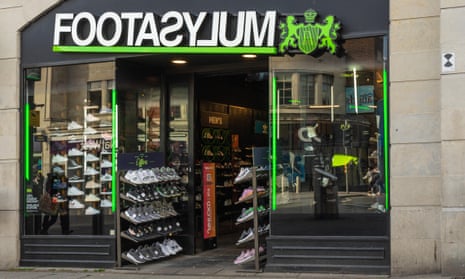JD Sports and Footasylum have been fined almost £5m for sharing commercially sensitive information during an investigation by the UK competition watchdog, which accused them of deleting phone records, and found their chairmen to have held multiple clandestine meetings including one caught on video in a car park near Bury in Greater Manchester.
JD Sports bought the trainer retailer for £90m in 2019 in a deal that was subsequently subjected to an in-depth investigation by the Competition and Markets Authority, during which time the companies were ordered to operate as separate businesses.
In November, days after the CMA ordered the deal to be unwound over competition concerns, a covert video recording emerged of the JD Sports executive chairman, Peter Cowgill, and his counterpart at Footasylum, Barry Brown, holding a meeting in a car park during the investigation period.
On Monday, the CMA published the findings of a new investigation, fining the companies a combined £4.7m for holding two meetings in which they “exchanged commercially sensitive information”.
“There is a black hole when it comes to the meetings. Both CEOs cannot recall crucial details about these meetings,” said Kip Meek, the chair of the CMA inquiry group. “On top of this, neither CEO or JD Sports’ general counsel can provide any documentation around the meetings – no notes, no agendas, no emails and poor phone records, some of which were deleted before they could be given to the CMA.”
The CMA said it used its information-gathering powers to try to develop a “clearer picture”, including submitting legally binding requests to the companies for information, to which they did not respond in full.
It said information discussed included Footasylum’s issues with stock allocations from key brands, financial performance, the planned closure of six stores, contract negotiations with its transport and delivery provider and terms regarding the renewal of its head office space.
“This fine should act as a warning,” Meek said. “If you break the rules there will be serious consequences.”
The CMA said it had fined JD Sports £4.3m for failure to comply with its order to operate as a separate business during its investigation. Footasylum was fined £380,000.
JD Sport said that at no point did it intend to break any rules and “always acted honestly and in good faith in its efforts to comply” with the CMA.
However, it did accept that “inadvertently it was in the receipt of limited commercially sensitive information and that this was not reported to the CMA immediately”.
The company hit out at the CMA saying that no phone records were deleted, although it admitted some records were “not available”. It said there was no ban on the two CEOs meeting as part of the CMA’s order.
It added that there was no legal requirement for it to notify the CMA of the meetings, or to take notes.
“A number of the conclusions which the CMA have drawn are either incorrect or have been presented in a misleading manner through the use of inflammatory language,” the company said in a statement.
“Whilst JD accepts that some phone records were not available, it absolutely refutes any allegation that this was due to records being deliberately deleted. In this regard, JD can also confirm that it voluntarily submitted all of its relevant devices to a third party for expert forensic analysis.
“Ultimately, JD does not believe that the description of events or the penalty that has been levied is a fair reflection of the group’s efforts to ensure compliance with the [CMA] order.”
